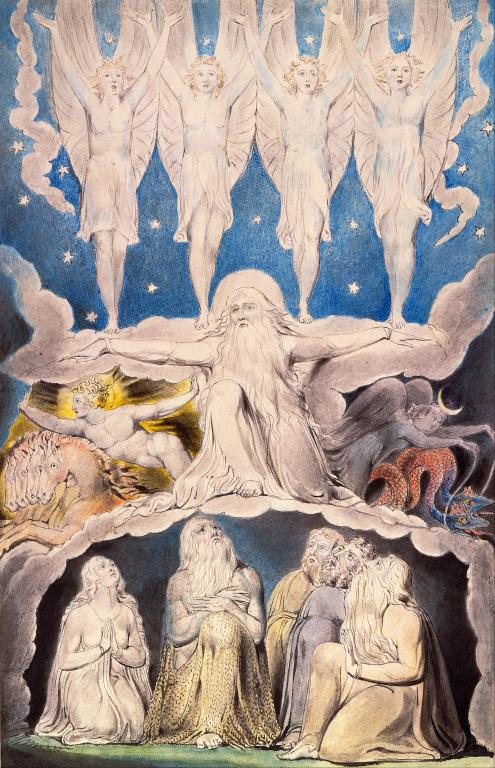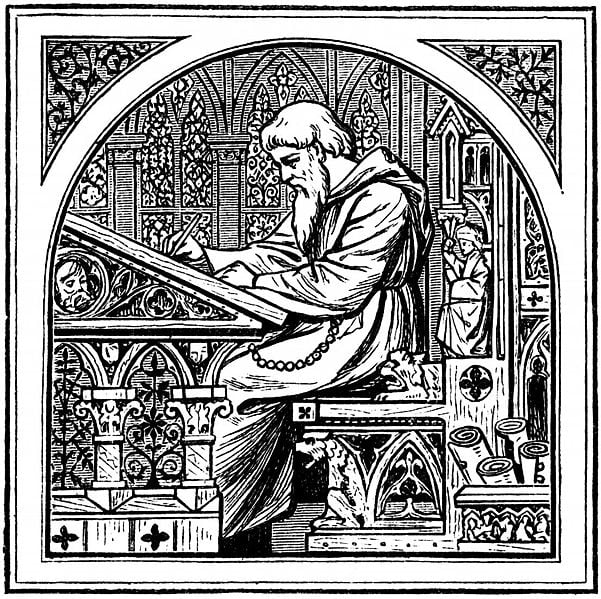1 August 2013
Beeston, Nottinghamshire
Dear Friends and Family,
Here’s another extract from my second chapter on Deification Creation. I hope you enjoy. Feel free to leave comments below:

The Need for a Deifier
What is left, in the end, is a created order that is good, that has an end which is God, and which it cannot achieve on its own. The universe needs humanity to fulfil its end in God, for without humanity, there is no one to receive creation as a gift and to mediate between creation and God as recipients. In humanity, then, there is the given vocation of serving as icons and priests to the rest of creation, showing forth the attributes of God. However, even though humanity has an innate desire for the divine, for divinity, for God, but this mad desire, as de Lubac calls it, cannot be met or fulfilled by humanity. The desire may be natural, but its fulfilment must be super- natural. Creation needs a deifier, one alongside of whom it can work. As Vladimir Lossky writes, ‘Certainly man was created by the will of God alone; but he cannot be deified by it alone. A single will for creation, but two for deification. A single will to raise up the image but two to make the image into a likeness.’1 God can create in his image, but cannot make man a god, according to Lossky. Instead, man must also will this. Lossky will go on to argue that humanity, prior to the Fall, may have been able to deify itself.2 In fact, in commenting on the Fall, Lossky seems to suggest that hu- manity would have enacted its own deification which would have made bridgeable to the gap between Creator and creature: ‘The infinite distance between the created and uncreated, the natural separation of man from God which ought to have been overcome by deification became an impassable abyss for man after he willed himself into a new state, that of sin and death, which was near a state of non-being.’3 This, how- ever, seems unlikely given both Scripture and the Fathers. Instead, it seems more likely that God requires our cooperation in order to deify us. That is, even though humanity wills to be like God and God wills it for them, the two wills must work together. So far I agree with Lossky. However, it seems that more than this is necessary in order to deify.
It cannot be emphasised enough that deification is the intended end for crea- tion from the very beginning. As Andrew Louth writes, ‘[D]eification is the fulfil- ment of creation, not just the rectification of the Fall.’4 Elizabeth Theokritoff simi- larly writes, ‘The Incarnation is not primarily a remedy for something gone wrong; it inaugurates the union between God and his creation for which all things were created.’5 It would be wrong to picture deification as merely a response to human- ity’s sin. It is not simply the resolving of this issue, though it is that, it goes beyond, it is the intended goal for creation from the very beginning. This is not, however, a goal creation can complete on it is own.
Creation Incomplete on Its Own
Maximus has reminded us that created beings cannot reach their own ends. They cannot fulfil themselves.6 Even any deathlessness humanity may have possessed in the story of the garden was not by nature. Aquinas tells us that it was by grace ‘that man was deathless before sin happened’ (ST 1a. 76, 5, ad 1). Adam, while without sin and incorruption, was still subject to becoming.7 Just as creation was in- complete without humanity, incapable of attaining its own end, so too is humanity incomplete without a deifier, without someone to raise him up to the status of divinity by participation, by grace, by adoption. Anthony Baker again reminds us, ‘Perfection is God’s gift to creation––the gift, in fact, of creating––and in sharing this creative work the divine nature opens itself entirely to creatures, extending to us the gift of our true and ultimate telos.’8 This gift, however, must be received and even then, it must be given. And while it is partially given in the act of creation itself, even this is not enough. Creation is still incomplete for it is not perfected. As I argued above, creation is incomplete without humanity, but humanity as well cannot bring about its own end, it cannot complete itself. Something much more surprising must happen. If God were truly the divine watchmaker or deism, then it would stand to reason that the telling of time (the end for which a watch is made) would occur naturally and re- quire only maintenance, but not divine aid in reaching its end, it would have been created at its end, that is the moment it started telling time it would have accomplished its end. This, however, is not the understanding of creation or its end the Father’s had. Instead, it seems that something more is needed for creation to reach its telos.
Creator Must Cross the Creature-Creature Divide
‘Christ assumed an individual and concrete nature that was in no wise “the” human nature as such. Yet what is more, by means of this partial contact, he touched nature in its entirety, a nature that is indivisible and continuous. And by this vital unity, he transmits grace, resurrection, and divinization to the entire body, thus uniting all mean, and through them, all creation to himself.’
-Hans Urs von Balthasar 9
What Balthasar notes in the quote above perhaps takes us beyond the purview of this chapter, but necessarily so. As I argued above, creation is incomplete without humanity, but humanity too is incomplete on its own. The only way creation’s telos can be completed is if the creator crosses the divide that separates him from creation. Only in this manner can deification reach to all of creation. Just as humanity takes within itself all of creation, so Christ by becoming man takes on all of creation and unites to it his divinity. More on this, however, in chapter 4. De Lubac writes concerning Augustine:
[Augustine] also realized the great gulf in any circumstances between the creation and Creator, and the madness of the creature’s dream, inspired by the Creator, to raise himself up to him for everlasting union. And in the revelation of Jesus Christ what he could see was principally the declaration that this mad dream could become a reality because it corresponded to the entirely gratuitous plan governing creation.10
We have noted this before, but it bares repeating, while humanity desires its proper end, it cannot accomplish it for its proper end is well beyond what it could even dare to hope for, union with God. The entire second chapter of Balthasar’s A Theological Anthropology is dedicated to the notion that humanity cannot perfect itself.11 Again, as Thunberg writes concerning Maximus, there is a gulf between humanity and God which only the ‘will of God can overbridge.’12 This is explicitly not something humanity can accomplish on its own.
1 Vladimir Lossky, Orthodox Theology: An Introduction, translated by Ian and Ihita Kesarcodi-Watson (Crestwood: St Vladimir’s Seminary Press, 1978), 73.
2 Vladimir Lossky, The Mystical Theology of the Eastern Church, trans. members of the Fellowship of St. Alban and St. Sergius (London: James Clarke and Co., LTD., 1957), 136.
3 Vladimir Lossky, The Mystical Theology of the Eastern Church, trans. members of the Fellowship of St. Alban and St. Sergius (London: James Clarke and Co., LTD., 1957), 135.
4 Andrew Louth, ‘The Place of Theosis in Orthodox Theology,’ in Partakers of the Divine Nature: The History and Development of Deification in the Christian Tradition, edited by Michael J. Christensen and Jeffery A. Wittung (Grand Rapids: Baker Academic, 2007), 34-35.
5 Elizabeth Theokritoff, ‘Creator and creature,’ in The Cambridge Companion to Orthodox Christian Theology, edited by Mary B. Cunningham and Elizabeth Theokritoff (Cambridge: Cambridge Univer- sity Press, 2008), 69.
6 Hans Urs von Balthasar, Cosmic Liturgy: The Universe According to Maximus the Confessor (San Francisco: Ignatius Press, 2003), 132.
7 Lars Thunberg, Microcosm and Mediator: The Theological Anthropology of Maximus the Confessor, 2nd Edition (Chicago: Open Court Press, 1995), 144.
8 Anthony D. Baker, Diagonal Advance: Perfection in Christian Theology (SCM Press, 2011), 141.
9 Balthasar, Hans Urs von. Presence and Thought: An Essay on the Religious Philosophy of Gregory of Nyssa, translated by Mark Sebanc (San Francisco: Ignatius Press, 1995), 134-35.
10 Henri de Lubac, Augustinianism and Modern Theology, translated by Lancelot Sheppard. (New York: Crossroads Publishing, 2000), 17.
11 Hans Urs von Balthasar, A Theological Anthropology, trans. by Benziger Verlag (New York: Sheed and Ward, 1967), 43-72.
12 Lars Thunberg, Microcosm and Mediator: The Theological Anthropology of Maximus the Confes- sor, 2nd Edition (Chicago: Open Court Press, 1995), 51.
Sincerely yours,
David
Related articles
- Thesis Extract: ‘The Four Aspects of Deification’ (elflandletters.wordpress.com)
- Thesis Extract: ‘The Role of Humanity in Creation’ (elflandletters.wordpress.com)
- Thesis Extract: ‘Thomas Aquinas’s Five Ways as Evidence of Deification’ (elflandletters.wordpress.com)











